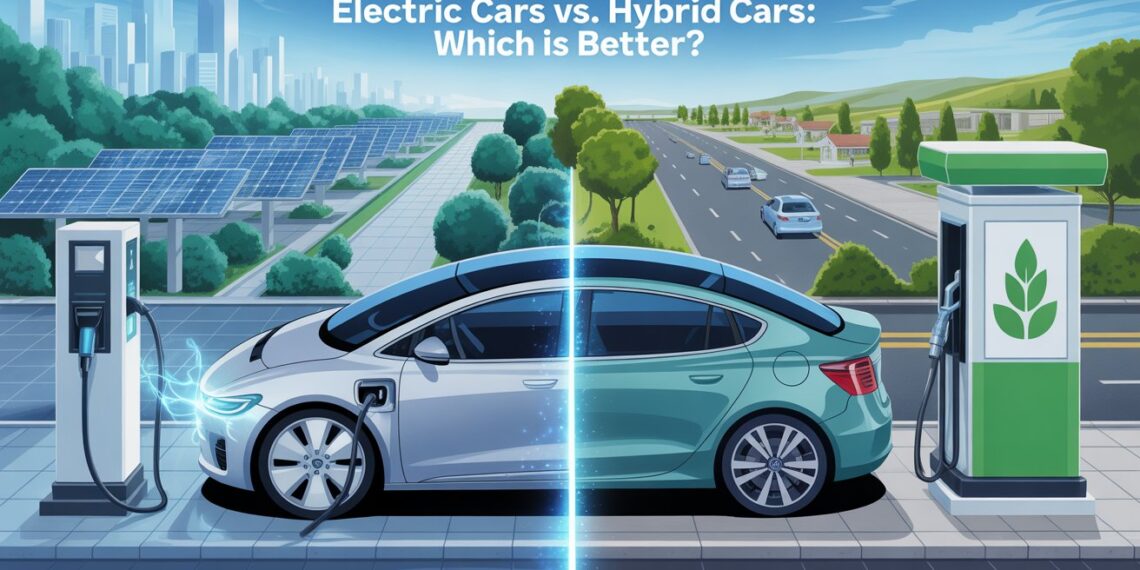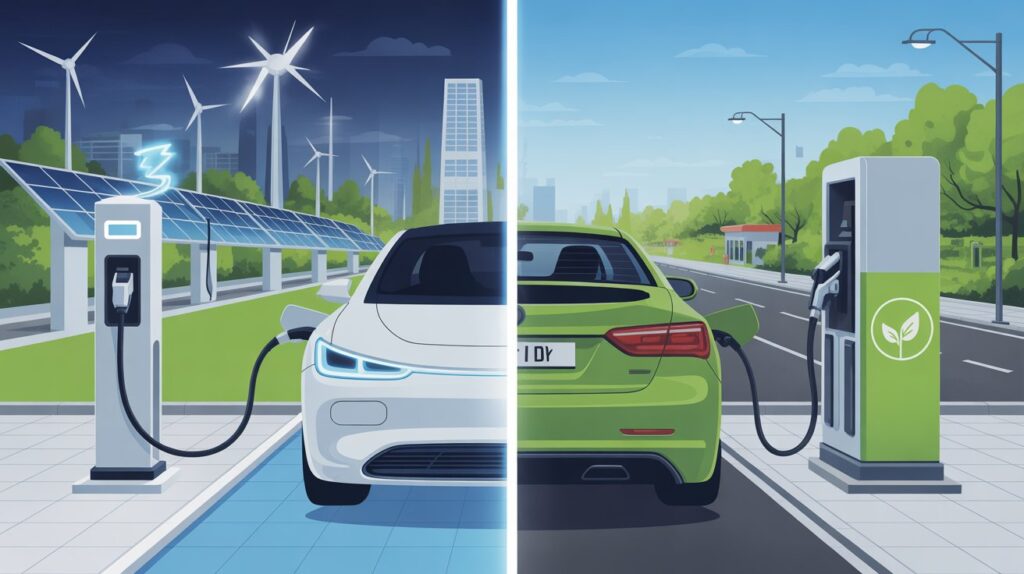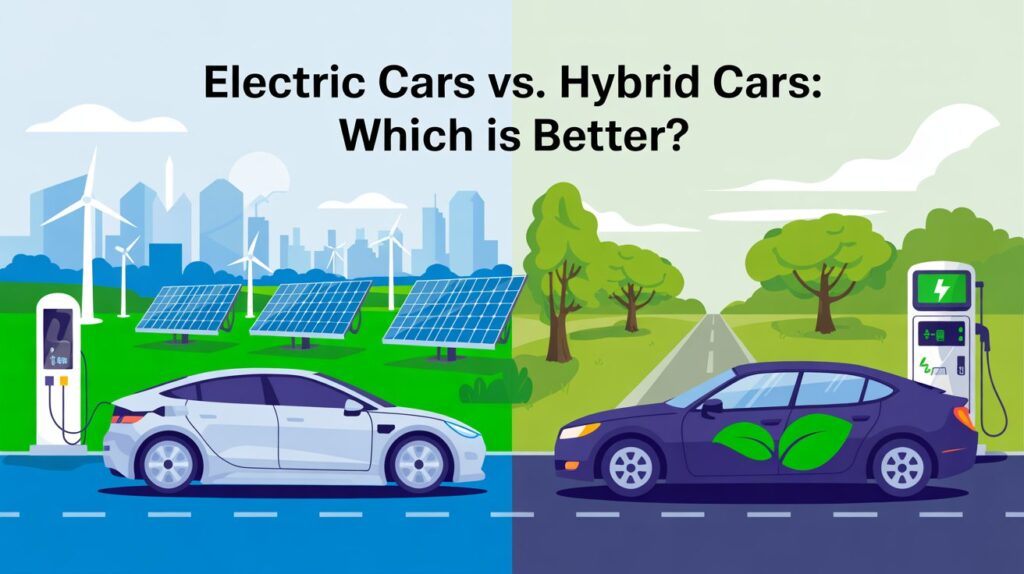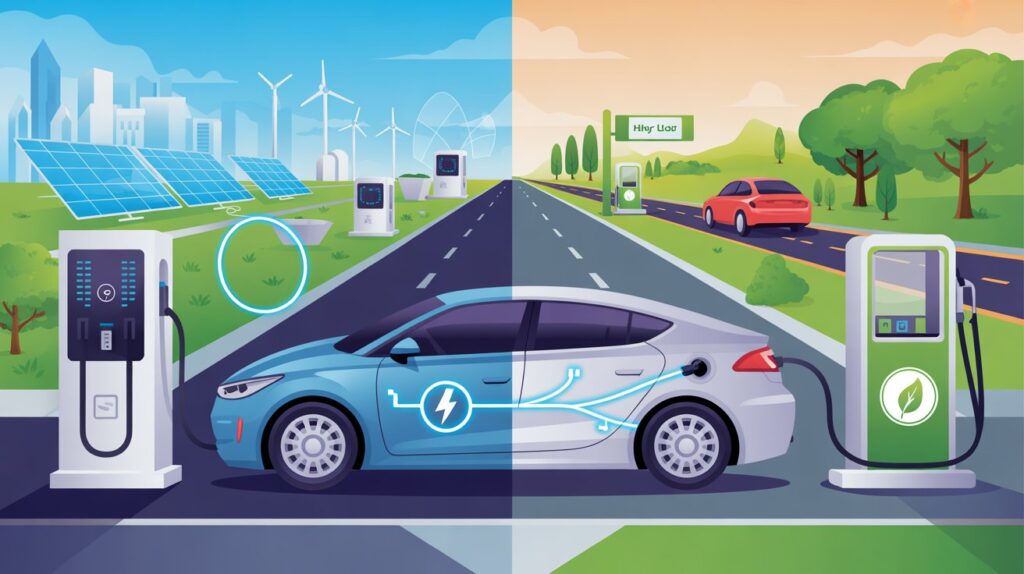The automotive industry is undergoing one of the biggest transformations in its history. Concerns over climate change, rising fuel costs, and government regulations have accelerated the shift from traditional gasoline engines to alternative powertrains. Two of the most popular options today are electric cars (EVs) and hybrid cars (HEVs and PHEVs).
Both technologies promise lower emissions and fuel savings, but they serve different needs. While some drivers are ready to embrace fully electric mobility, others prefer the balance of hybrids that combine a gasoline engine with an electric motor.
This article explores the debate around Electric Cars vs. Hybrid Cars: Which Is Better? We will break down how each type works, compare their costs, environmental impact, convenience, and long-term value, and provide guidance to help you decide which option is the right fit for your lifestyle.
Understanding the Basics
What Is an Electric Car (EV)?
An electric car, often called a Battery Electric Vehicle (BEV), runs entirely on electricity stored in a rechargeable battery. It has no gasoline engine, no exhaust pipe, and no traditional fuel tank. The electric motor delivers instant torque, providing quick acceleration and a smooth driving experience.
-
Key features:
-
Powered entirely by a battery pack
-
Requires charging from a home outlet or public station
-
Zero direct emissions
-
Quiet operation and fewer moving parts
-
Examples: Tesla Model 3, Nissan Leaf, Hyundai Ioniq 5, and BYD Atto 3.
What Is a Hybrid Car?
A hybrid car combines a traditional internal combustion engine (ICE) with an electric motor and battery. Depending on the type, the electric motor either assists the gasoline engine, powers the car for short distances, or allows the vehicle to run in full EV mode for limited mileage.
Types of Hybrids
-
Mild Hybrid (MHEV): The electric motor cannot drive the car alone. It assists the gasoline engine to improve fuel efficiency.
-
Full Hybrid (HEV): Can operate using the engine, the electric motor, or both. Example: Toyota Prius.
-
Plug-in Hybrid (PHEV): Has a larger battery that can be recharged from an external power source. Can run on electric-only mode for 20–60 km before switching to gasoline. Example: Mitsubishi Outlander PHEV.
Cost Comparison
Purchase Price
-
Electric Cars: Generally more expensive upfront due to costly battery packs. Prices are slowly dropping as battery technology advances.
-
Hybrids: Typically cheaper than EVs but more expensive than conventional gasoline cars.
Running Costs
-
EVs: Electricity is significantly cheaper than gasoline on a per-kilometer basis. For instance, charging an EV might cost 30–50% less than refueling a hybrid.
-
Hybrids: Fuel savings are noticeable compared to pure gasoline cars, but less than a fully electric vehicle.
Maintenance
-
EVs: Require less maintenance because they lack oil changes, exhaust systems, and complex transmissions. Battery degradation is the main long-term concern.
-
Hybrids: Have both a gasoline engine and electric components, meaning more parts to service. However, they are usually more reliable than traditional vehicles.
Driving Range and Convenience
Range
-
EVs: Modern EVs offer between 250–600 km of range per charge, depending on the model. Range anxiety remains a concern for long trips.
-
Hybrids: Can travel as far as traditional cars since they rely on gasoline when the battery depletes. Perfect for drivers in areas with limited charging infrastructure.
Charging vs. Refueling
-
EVs: Home charging is convenient but slow (6–12 hours for a full charge). Fast charging stations can recharge up to 80% in under an hour, but availability varies.
-
Hybrids: Gasoline refueling takes only minutes, and no special charging infrastructure is required (except for PHEVs when charging to maximize efficiency).
Environmental Impact
Emissions
-
EVs: Produce zero tailpipe emissions, making them cleaner in urban areas. Their overall carbon footprint depends on the electricity grid mix (renewables vs coal).
-
Hybrids: Emit less CO₂ than conventional cars but still produce exhaust emissions when running on gasoline.
Battery Production and Recycling
Both EVs and hybrids rely on lithium-ion batteries. Mining and processing of lithium, cobalt, and nickel have environmental and ethical concerns. However, recycling programs and second-life applications (such as energy storage) are expanding.
Performance and Driving Experience
-
EVs: Provide instant torque, quiet driving, and smooth acceleration. Perfect for city driving and those who value modern technology.
-
Hybrids: Deliver balanced performance, offering fuel savings without sacrificing long-distance reliability. The transition between engine and motor is usually seamless in modern hybrids.
Ownership Experience
Insurance and Resale Value
-
EVs: Insurance may be higher due to expensive battery replacement costs. Resale value varies by model but is improving as demand grows.
-
Hybrids: Typically have stable resale values because they appeal to a wide market. Insurance costs are moderate.
Reliability
-
EVs: Fewer mechanical parts mean less risk of breakdowns. Battery degradation is the main concern.
-
Hybrids: Proven reliability, especially models from Toyota and Honda. However, more complex systems mean potential for higher repair costs in the long term.
Infrastructure and Availability
EV Charging Networks
In developed markets, public charging stations are expanding rapidly. However, in regions where charging infrastructure is limited, owning an EV can be challenging.
Hybrid Accessibility
Hybrids don’t depend on charging networks, making them more practical in areas with unreliable electricity or scarce charging facilities.
Future Trends
-
EVs: Governments worldwide are pushing for full electrification. Many countries plan to ban new gasoline car sales between 2030–2040. Battery technology is advancing toward solid-state batteries with faster charging and longer lifespan.
-
Hybrids: Still relevant as a transitional technology, especially in developing regions. They may remain popular for at least another decade, bridging the gap until EV infrastructure becomes widespread.
Electric Cars vs. Hybrid Cars: Which Is Better?
The answer depends on your needs:
-
Choose Electric Cars if you:
-
Have reliable access to charging (home or public)
-
Drive mostly in cities or short-to-medium distances
-
Want zero emissions and lower running costs
-
Are comfortable with higher upfront investment
-
-
Choose Hybrid Cars if you:
-
Frequently drive long distances
-
Live in areas with poor EV infrastructure
-
Want fuel efficiency without range anxiety
-
Prefer a more affordable entry point into eco-friendly driving
-
In short, neither is universally “better.” Instead, the right choice depends on lifestyle, driving habits, and local infrastructure.
Frequently Asked Questions (FAQs)
1. Are electric cars cheaper to own than hybrids?
Yes, in the long term, EVs usually cost less to operate due to cheaper electricity and fewer maintenance needs. However, their higher purchase price may offset these savings in the short term.
2. How long do EV and hybrid batteries last?
Most EV and hybrid batteries last 8–15 years depending on usage and climate. Manufacturers typically offer 8-year warranties.
3. Do hybrids need charging?
Standard hybrids (HEVs) do not need charging. Plug-in hybrids (PHEVs) do require charging to maximize electric-only range.
4. Which is more eco-friendly, hybrid or electric?
EVs are more eco-friendly during operation, producing zero tailpipe emissions. However, their manufacturing footprint is higher. Over the lifetime of the vehicle, EVs generally have a lower environmental impact than hybrids.
5. Are hybrids going to be phased out?
Some countries may eventually phase out hybrids along with gasoline cars. However, in many regions, hybrids are expected to remain available as a transitional technology for the next 10–15 years.
Conclusion
The debate over Electric Cars vs. Hybrid Cars: Which Is Better? has no single answer. Both offer benefits compared to traditional vehicles, but they cater to different drivers. Electric cars are the clear winner for those with access to charging infrastructure and a desire for lower long-term costs and zero emissions. Hybrids, however, remain an excellent choice for drivers who want flexibility, affordability, and peace of mind on long trips.
Ultimately, the best option depends on your driving patterns, local infrastructure, and budget. By carefully weighing the pros and cons outlined in this guide, you can make a confident decision that aligns with your lifestyle and environmental goals.












